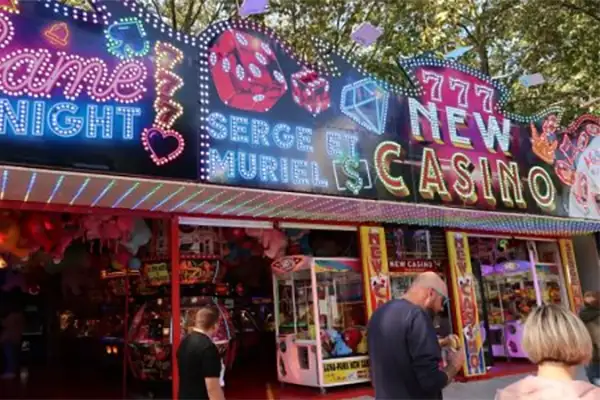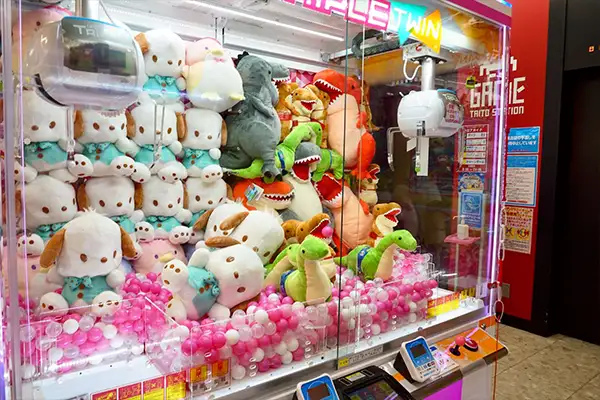Lunapark: from games of skill to games of chance
Between the many rides installed at the Liège fair since October 5, various lunapark-type stands have taken place. For a few euros, you are promised stuffed animals and other prizes. This strongly resembles games of chance, yet they are not considered as such and therefore are not subject to the same regulations. On n’est pas des pigeons, a well-known RTBF program, has looked into the matter.
The fair in Liège, one of the three largest fairs in Belgium, is the October event not to be missed for the vast majority of Liège residents. Between two rides, there are food stands but also the essential “lunapark” game stands. Attracting adults and children with the promise of superb prizes in exchange for a little skill and a few euros. Some claw machines are filled with stuffed animals while others promise mobile phones worth several hundred euros and other big prizes.
Who has never tried their luck on these claw machines, hoping to win the coveted gift? Behind this seemingly simple game lie complex psychological mechanisms that largely explain the appeal it has on players. Game of skill or game of chance? On n’est pas des pigeons looked at these games typical of amusement parks and other fairs. Although they are based on mechanisms similar to games of chance, including the “almost win”, they escape strict regulation.
The “almost win”, a well-studied lure
One of the main levers used by the manufacturers of these machines is the concept of “almost win” or “near miss”. This phenomenon occurs when the player is on the verge of winning their prize, but the claw releases the object at the last moment. This frustrating experience, while being close to the reward, has a powerful effect on the brain. Indeed, it creates a feeling of near-victory that encourages the player to persevere, convinced that he is about to succeed.
“It’s like the jackpot when the first two reels line up a 7 and the third one lands on the 7… but finally freezes on another number. The player says to himself: I almost won, it will end up working. It’s done on purpose. This encourages you to continue.”
Aurélien Cornil, professor of psychology at Uliège
Claw machines are designed to give players the illusion of being able to control the outcome of the game. By pressing the buttons, they feel like they are influencing the movement of the claw and increasing their chances of winning. However, the reality is quite different. The grip strength of the claw, the programming of the machine and the position of the objects are elements that are largely beyond the player’s control.

This feeling of illusory control is similar to that found in traditional gambling games such as poker or sports betting. Players tend to overestimate their ability to influence the results, based on their skills or knowledge. However, chance plays a major role in these games.
Claw machines therefore exploit cognitive biases to encourage players to persevere, even when the chances of winning are low. The “almost win” and the feeling of illusory control are powerful psychological mechanisms that explain much of the appeal of these games.
An exception to the law on games of chance
In Belgium, as in many countries, games of chance are subject to strict regulations. The aim of this legislation is to protect players, combat addiction and regulate the activities of operators. Casinos, online games and lotteries are therefore subject to licenses and strict controls.
However, games present in amusement parks and fairs, although similar to games of chance, seem to escape this regulation. Why? The answer lies in a short sentence in the law: Art. 3 The following are not games of chance within the meaning of this law: (…) b) games operated in amusement parks or by fairground operators on the occasion of fairs, trade fairs or other and similar occasions;

According to Magali Clavie, chair of the gaming commission, the legislator considered that the amounts at stake at a fair or in lunaparks were too low to be considered casinos.
While this exception can be justified for traditional fairground games, the situation is more complex with the emergence of new games and new machines offering potentially high winnings, such as smartphones, game consoles and televisions. This development raises questions about the relevance of regulations that do not take these new issues into account.
“The problem is that the concept of “low stake or low winnings” has not been defined. And when we see that some prizes at fairgrounds can exceed 1,000 euros, for example in the form of an iPhone, we think that the legislator should set a limit.”
Magali Clavie
The risks of addiction
Even if the amounts at stake are often modest, the psychological mechanisms at work in these games can encourage the development of an addiction. Children, in particular, are particularly vulnerable to these mechanisms and can develop compulsive behaviors. They are also the first to be targeted by these machines filled with stuffed animals or game consoles.

So are lunaparks dangerous for children? Should they be banned from them? Magali Clavie is not convinced.
“Dangerous, I wouldn’t say that, but we have to explain to children that we don’t go to a lunapark to get rich but to have fun. We also have to teach children to set limits. If I decide to play for 10 euros and I don’t win anything, I stop. Period. And I don’t play until I win something.”
Magali Clavie
While waiting for a possible change in the legislation, it is up to parents to make their children aware of the mechanisms of these games and teach them to resist temptation.


